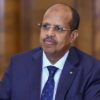ABUJA, Jan 13 – Nigeria\’s ruling party picks a presidential candidate Thursday for April\’s landmark elections amid a surge in violence and divisions between the mainly Muslim north and predominately Christian south.
President Goodluck Jonathan, thrust into office in May after the death of his predecessor, is expected to win the Peoples Democratic Party nomination, but he faces a challenge from ex-vice president Atiku Abubakar.
The primary vote set to take place in the capital\’s Eagle Square, where thousands of party delegates will cast ballots, comes after bomb blasts and other attacks in recent weeks have left scores dead in Africa\’s most populous nation.
Heavy security has been deployed in Abuja, which has been hit by two bomb attacks since October.
In one of the attacks, twin car bombs went off on October 1 near Eagle Square, where Nigerian leaders and foreign dignitaries had gathered to commemorate the country\’s 50th year of independence from Britain.
The PDP has won every presidential election since Nigeria returned to civilian rule in 1999, and the stakes will be high in the run up to the April 9 vote in the continent\’s largest oil producer.
While Jonathan is favoured, he has faced a strong challenge from Abubakar and there have been divisions in the party, with some arguing it should abandon the president in favour of a candidate from the north.
The dispute stems from an arrangement that sees the party\’s candidates rotated between the country\’s predominately Muslim north and mainly Christian south every eight years.
Jonathan, a southern Christian, took office in May following the death of Umaru Yar\’Adua, a northerner who was still in his first term.
For that reason, some say another northerner should be given the nomination. Abubakar is a Muslim from the north.
The arrangement has served as a way of smoothing over ethnic, religious and social divides in a country of some 250 ethnic groups and 150 million people.
It has been viewed as both an outdated policy pandering to tribal politics and a power-sharing deal helping hold the vast country together.
Thursday\’s vote is "a confrontation between the old-style politics which emphasises religion, ethnicity …, but our own campaign is this country ought to move forward," said Jonathan\’s campaign spokesman Sully Abu.
Atiku\’s spokesman Shehu Garba claims backing Jonathan would put Nigeria\’s democracy at risk.
The primary vote will present a contrast in styles. Jonathan, 53, is a fedora-wearing zoologist with an understated approach that has won him both plaudits and critics.
Abubakar, 64, is a longtime political player noted for his wealth and ability to work the levers of power, but he has also been accused of major corruption, which he strongly denies.
No matter who emerges, the April vote is being viewed as one of the most important in the country\’s history, testing Nigeria\’s ability to organise a credible poll after a series of violent and deeply flawed ballots.
It will take place as authorities seek to contain the violence in the oil-producing Niger Delta region, the attacks in the north blamed on an Islamist sect and unrest attributed to a power struggle in central Nigeria.
Jonathan has pledged a free and fair vote, "but there will be shortcomings," Abu said, repeating the generally held view.
"You are still going to have people who will try to rig the election or intimidate voters…but the difference is that it\’s not going to be systemic but sporadic," he said.
Regarding the primary, admits Abu, "I don\’t expect we are going to have a perfect process tomorrow, but I do know it will be another step in the journey to the kind of democracy we want to achieve."














































